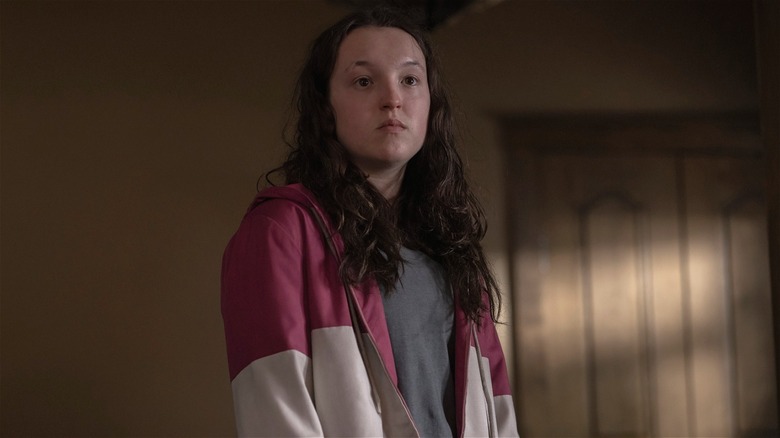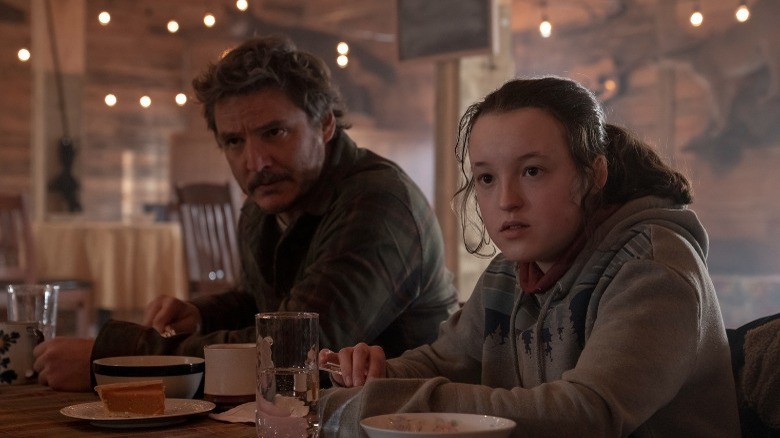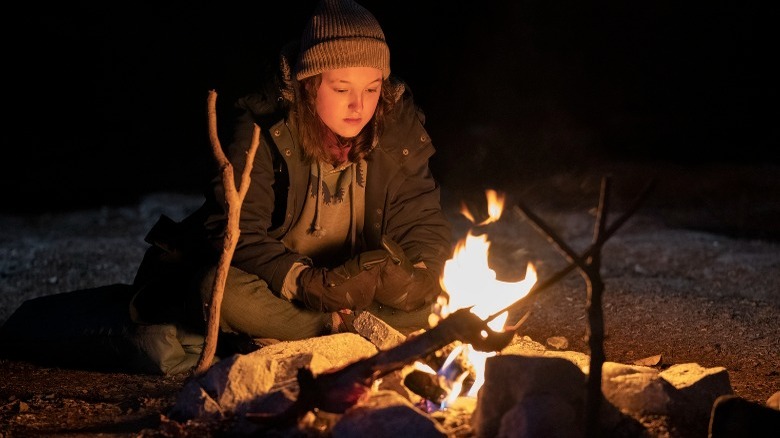Ellie's Emotional Scene In The Last Of Us Episode 6 Shows She's Much More Than A Snarky Sidekick
This post contains spoilers for HBO's "The Last of Us" and the video game series of the same name.
HBO's "The Last of Us" closed out last week's episode with two heartbreaking deaths that underlined an ugly truth: No one is safe in the show's ruthless world. This incident leaves an indelible mark on Joel (Pedro Pascal) and Ellie (Bella Ramsey), who had finally found themselves opening up to people who navigated the apocalypse with gentleness, but this hope is prematurely (and rather cruelly) dashed. Episode 6 of the show, "Kin," which fast-forwards three months, takes a break from infected-centered action and offers a relatively safe space with the introduction of the Jackson commune. While this shift ignites complex emotions in Joel, who struggles with notions of inadequacy and the fear of loss, it also allows us a real glimpse into Ellie, who hides a wealth of emotions beneath her sarcastic snarkiness.
The journey that the pair undertake has been rife with obstacles and imminent dangers so far, forcing both parties to defend themselves with violence and contend with moral complexities of these acts. Having undergone constant strife, the idyllic safe space of Jackson feels uncomfortable for both Joe and Ellie — while Joel has abandoned the hope of ever returning to normalcy, Ellie has never experienced true community and finds stability only in Joel's presence. Although reuniting with Tommy (Gabriel Luna) offers Joel much-needed solace, it presents him with the choice of leaving Ellie in far more capable hands. At least that's how Joel perceives the situation when battling with trauma-induced stress.
While Joel's emotions are easier to parse, Ellie's emotional outburst reveals surprising layers to her character, with the show expertly unraveling who she is in a taut, dramatic moment that deepens our understanding of her.
The emotional dam breaks
The episode opens with the duo moving west, while getting more comfortable and vulnerable with one another as time passes. Ellie is as quick-witted and foul-mouthed as usual, but her shift in perspective from viewing Joel as a means-to-end protector to someone she genuinely cares about is subtle but evident. On the other hand, Joel is less guarded in his replies, to the point that he opens up about his dreams for the future, should he make it out alive. Although still guarded, Joel's increasing attachment to Ellie manifests in sudden panic attacks, as he steadily feels ill-equipped to protect her from harm. Joel believes he has lost his edge — and maybe, he has with time, which has allowed the trauma of losing his loved ones to truly sink in. However, he is unable to relay these emotions to Ellie, who solely trusts Joel and no one else.
In a faithful recreation of a memorable moment from the first game, Ellie and Joel have a confrontation in which the former asks the latter whether he cares about her or not. In the show, this conversation is triggered after Ellie overhears Joel asking Tommy to keep her safe, which makes her feel hurt and abandoned. Although Ellie starts off by making a snarky remark about people being preoccupied with inane things pre-apocalypse, what she says next is Ellie at her most honest and vulnerable.
By revealing that everyone except Joel has either abandoned her or is dead, Ellie allows him, and us, a peek into the intense pain she carries around with her. There is real fear at the prospect of losing him, which she articulates rather bluntly: It is irrelevant whether Tommy is more capable of keeping her safe. She only feels safe with Joel.
Much more than a sidekick
The confrontation scene, although short, is immensely effective in terms of the impact it has on the narrative. Ramsey emotes the scene with a fiery brand of vulnerability, perfectly understanding the core of the character, who tends to hide behind walls. Throughout her life, Ellie has been lonely, forced to mature quickly without any consistent guardian figures. Characters like Riley, Marlene, and even Tess have provided her with stability now and then, but her current reality and the weight of her condition make Joel her only hope. While sympathetic folks like Tommy or Maria might help her make it through another day, it is Joel who she chooses to stick by. Why else would a 14-year-old try so hard to make a guarded, grumpy middle-aged man laugh with dad jokes and puns?
Although the two exchange harsh words, everything is forgiven the moment Joel presents Ellie with a choice. This is the first time Joel allows Ellie to make a decision about her fate, allowing her to bypass the dependant sidekick status she has been assuming for quite some time. Moreover, Joel teaching Ellie how to hunt and her taking the onus to keep watch while he sleeps democratizes the status quo between them. With the episode ending on a concerning note, where Joel seems to be close to death, this sets the stage for Ellie to assume the role of protector. No child should have to undergo this, but circumstances will force her to take charge and save the only man she can depend on in this cold, harsh world.
Kudos to Ramsey for bringing the subtlest intricacies of Ellie to life in ways that are both beautiful and heartbreaking, cementing the character's enduring legacy in HBO's compelling, near-perfect adaptation.


